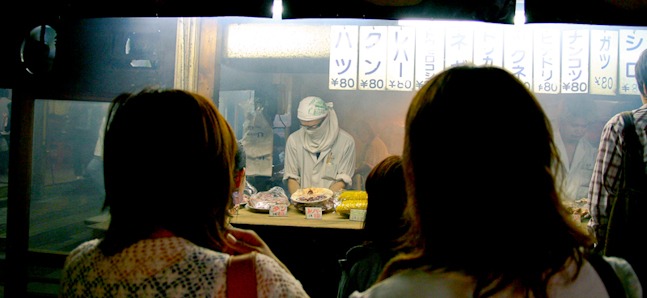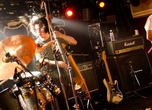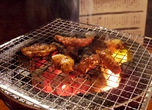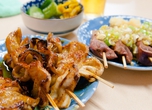
‘Iseya Souhonten’ (c) Martine Cotton Photography
Posted: Mon Mar 15 2010
Straddling two train lines, and a less than 20 minute train ride to Shinjuku and Shibuya, home to a park famous for seasonal metamorphosis and a plethora of funky shops and cafés for all budgets, it’s no wonder that Kichijoji consistently ranks at the top of Tokyo’s most popular places to live. No less likely is its easygoing, relaxed vibe, exuded in counterpoint to the stresses most commonly associated with the Tokyo lifestyle.
Praises aside, Kichijoji is not immune to gentrification or becoming victim to its own popularity. Bidding adieu on March 14, Isetan’s Kichijoji branch is undergoing an H&M facelift, and Yuzawaya (the recently defunct den of all things crafty) is rumoured to become a chain hotel, with the seventh and eighth floors of the Marui building housing remnant product from April 2. More welcome, however, is an overdue restoration of the Lon Lon shopping centre and station precinct, scheduled for completion later 2010.
Despite rising rents and the suburb undergoing its own ‘before and after’, there remains much to see and do in Kichijoji. Catch the train west to this suburban oasis and check out Time Out Tokyo’s picks for the best of the area.
Koen-guchi (park exit area)
Inokashira Koen
Inokashira Park may well indeed be Kichijoji’s heart and soul. Frequented by families, dating couples, joggers and pet-toting folks, the park is not only a popular hanami (cherry-blossom viewing) spot but also a prime destination to bask in verdant greenery or autumnal foliage. Whether visiting the park’s Benzaiten temple, taking an aquatic joyride via rental swan-shaped boats (¥700 for 30 minutes) or row boats (¥600 for 30 minutes), or catching the tunes of an impromptu busker, take the time to recharge with a caffeinated cuppa from Blue Sky Coffee – a welcome refuge from Seattle’s finest – or one of the uniquely flavoured soft-serve ice creams from Mizuki near the park’s Nanaibashi Dori entrance.
Address: 1-18-31 Gotenyama, Musashino, Tokyo
Admission: Free
Telephone: (0422)476 900
Iseya Souhonten Koen Shop
Serving yakitori to the masses since 1928, this Kichijoji stalwart is a must-visit for its frenetic Showa era charm and rock-bottom prices. While Iseya’s atmosphere trumps food quality, the usual ‘meat on sticks’ suspects apply at only ¥80 a pop, commonly devoured by the medley of impoverished students, curious day-trippers and genial salary-men frequenting either of the building’s rickety floors. Equally popular are the giant shumai (steamed dumplings, ¥330 a plate) and crispy fried gyoza (fried potsticker dumplings, ¥480 per serving), all to be washed down with similarly priced items from Iseya’s basic booze list.
Address: 1-15-8 Kichijoji-minamicho, Musashino, Tokyo
Telephone: (0422)432 806
Open: Tue-Sun 12noon-10pm (LO 9.30pm), closed Mon (except nat. holidays)
Website:www.iseya-kichijoji.jp/ (Japanese only)
Hammock Café and Gallery Mahika Mano
Kichijoji is renowned for its chilled-out atmosphere; perhaps the locals have cottoned on to what may very well be Tokyo’s only hammock café and gallery. Lacking chairs, Mahika Mano is a quasi-showroom for distributors Hammock2000, where guests are invited to choose a hammock and settle in for a kip (time limits enforced). Also operating as a gallery and event space, the café enforces a no children rule and offers a variety of LOHAS-style health conscious meals, the menu detailing the nutritional benefits of each dish. Liquid refreshment comes via boutique beers, original herb cocktails and coffee and tea. Hammocks are available for purchase, allowing customers to take a little bit of that ‘Kichi’ vibe back home.
Address: Sunpalace Bldg 1F, 2-8-1 Kichijoji-minamicho, Musashino, Tokyo
Telephone: (0422)425 930
Open: Sun-Thur 12noon- 8pm (LO 7.15pm); Fri-Sat 12noon-10pm (LO 9.15pm)
Website: mahikamano.com/ (Japanese only)
Circus Café
The newly opened Circus Café gives nod to Kichijoji’s illustrious and bohemian theatrical tradition. By day, the venue provides a simple menu with food and drink items priced from ¥500. Night, however, is when stars of all kinds shine, with aerial shows, cabaret and dancing on show. A ¥2,000 performance surcharge applies, redeemable with a variety of snack and nomihodai (all-you-can-drink) plans on offer. Check the website for café and showtime schedules.
Address: FS Bldg 4F, 1-1-9 Kichijoji-minamicho, Musashino, Tokyo
Telephone: (0422)249 601
Open: daily 12noon-4pm (café), 6pm-12midnight (show and bar)
Website: www.loveandleaf.jp/ (Japanese only)
Chuo-guchi (central exit and Sun Road area)
Dairakudakan Kochuten
Led by acclaimed artistic director Akaji Maro, Dairakudakan (aka ‘Great Camel Battleship’) is one of Japan’s most legendary butoh dance troupes. The modern dance ensemble calls Kichijoji home, with its cosy Kochuten rehearsal and performance space located a short walk from the central exit. The group is noted for enabling younger members to develop and stage original works, the majority of which are presented on a semi-regular basis. For those wanting to get their freak on, butoh classes are also offered – see website for schedules and further details.
Address: 2-1-18 Kichijoji-kitamachi, Musashino, Tokyo
Telephone: (0422)214 982
Website: www.dairakudakan.com/rakudakan/e_top.html
Harmonica Yokocho
Bar hoppers suffering from 'been there, done that' ennui are advised to head to here pronto. Offering nostalgic glimpses into Japanese bohemian drinking culture, the tachinomiya (standing only) bars and food joints that crowd Harmonica’s ramshackle alleyways attract all types. The area is no longer immune to renovation – a nail salon is one of Harmonica’s more recent tenants – but yakitori shackTecchan remains a perennial favourite, Japanese tapas bar Eihire is a welcome newcomer and Moskow’s rooftop vista can’t be beat when weather takes a turn for the good. During the daytime, Harmonica Yokocho is no less interesting: apart from mongers hawking anything from fresh fish to puckering pickles, Min Min’s gyoza (potsticker dumplings) and Taikashi no Amane’s taiyaki (fish-shaped griddle cakes filled with red adzuki bean paste) and kuzumochi (gelatinous sweets made from kudzu starch) have taste buds covered, while Satou Steakhouse Butchers are responsible for croquettes that invoke crazy queues.
Address: 1-1 Kichijoji-honcho, Musashino, Tokyo
Ayumi
The ramen world’s latest buzz is noodles for the ladies. Riding the trend is Italian celeb chef Kazuo Ishizuka and his noodle bar Ayumi. Continuing the cross-cultural noodle exchange first instigated by Marco Polo all those years ago, Ishiyuki brings Mediterranean flair to Chinese staples. To wit: ‘Italian-style White Ramen’ (¥980), which pointedly marries al dente noodles and prosciutto in a creamy white ramen broth. The store’s modern interior cuts a fashionable atmosphere, and is perfect for a date with girlfriends or impressing that guy from the office.
Address: Sansui Bldg 1F, 1-8-14 Kichijoji-honcho, Musashino, Tokyo
Telephone: (0422)233 260
Open: daily 11.30am-11pm
Bakery Café Linde
Thankfully, it’s not as difficult as it once was to get a decent loaf of bread in Tokyo. Whereas French bakeries abound, however, other European breadstuffs remain somewhat more elusive. Situated on Sun Road, Bakery Café Linde bucks this trend with owner Kenji Fujimoto supplying all things pretzel, pumpernickel and rye. Although loaves veer towards the pricey side, traditional German sandwiches and distracting pastries prove more affordable, and can be purchased to eat in-house or for take away picnics in the park. For those not able to get to Kichijoji, the bakery has an online store, though only available in Japanese.
Address: 1-11-27 Kichijoji-honcho, Musashino, Tokyo
Tel: (0422)231 412
Open: daily 10am-8pm
Website: www.lindtraud.com/ (Japanese only)
Yodobashi-ura (Yodobashi department store area)
Club Seata
Kichijoji is known for its jazz kissa (jazz coffee shops), live houses and blues bars, but has long lacked a larger sized mid-range venue catering to the clubbing and younger crowds. Until, that is, the recent arrival of Club Seata. Located on the old LAOX site, the club’s an easy stagger from Kichijoji station. While the name is nothing to write home about, Seata’s lighting and sound system tick all the right boxes.
(Full details & map)
Café Zenon
The Ghibli Museum may be Musashino’s most famous animé attraction, but as home to many a manga studio, it was only a matter of time until Kichijoji earned itself Café Zenon, a self-billed ‘manga art café’. The space itself is cavernous, the walls decorated with a rotating array of artworks and the food more than ample sustenance for artists and fans alike. Despite its size, Café Zenon strives to create a supportive environment for manga enthusiasts, and is involved in event tie-ins and promos.
Address: 2-11-3 Kichijoji-minamicho, Musashino, Tokyo
Telephone: (0422)290 711
Open: daily 11-1am (food LO 12midnight, drinks LO 12.30am)
Website: www.cafe-zenon.jp (Japanese only)
Saké bar Kaikan
Located on a side street running parallel to Kichijoji Odori, it would be easy to miss Kaikan if it wasn’t for the noren (traditional curtain hanging at the shop’s entrance) leading the way upstairs. Popular with locals, and specialising in junmai-style saké (no added alcohol or sugar), the bar is small, comfortably seating ten people around a large counter. Kaikan owner and master – Mr. Ogura – stocks familiar and lesser known, boutique brands, and keenly imparts his knowledge when asked. The snacky food menu – featuring Japanese, Western and fusion dishes – is given just as much care, changing regularly according to freshness and availability.
Address: Tsuji Bldg 2F, 1-25-6 Kichijoji-honcho, Musashino, Tokyo
Telephone: (0422)218 474
Open: Mon-Sat 6pm-1am, closed Sun
Tokyu-ura (Tokyu department store area)
Furo Rock
Giving further credence to Kichijoji’s creativity is the public bathhouse come rock venue Furo Rock. Operating sporadic Thursdays out of the Benten-yu sento (public bath), Furo Rock primarily showcases acoustic and electronic music to audiences keen to support the venue’s livelihood and soak up the unusual atmosphere. In operation since 2005, university student and Furo Rock organiser Ryuhei Oka has so far curated a ¥3,500 per ticket program that’s included the likes of Otomo Yoshihide, Asa-Chang and Junray and Jim O’Rourke. An enforced shoes-off, no camera policy doesn’t dampen the fun when a Mount Fuji trompe l’oeil, beer and snacks are readily there to be enjoyed. Check website for updated schedule and ticket availability.
Address: Benten-yu, 2-27-13 Kichijoji-honcho, Musashino, Tokyo
Website: furorock.com/ (Japanese only)
Green Hill
Curiously combining the aura of a hotel lobby with bachelor pad and an antique museum, Green Hill walks a fabulously fine line between gorgeous and gaudy. Run by a husband and wife team, the store’s Nakamichi dori smoked glass façade reveals few clues to its interior, which has changed little since first opening in 1974. The background music ranges anywhere from classic to ‘mood’, and the drinks menu features typical Japanese-style coffees such as drip and blend, among others.
Address: 2-25-8 Kichijoji-honcho, Musashino, Tokyo
Telephone: (0422)226 867
Open: Mon-Tue, Thur-Sun, 11.30am-7pm, closed Wed
Ocharaka
Kichijoji isn’t just about coffee. It’s equally focused on tea. Passionate about Japanese tea and wanting to broaden its fan base, owner Stephane Danton has designed a number of flavours and blends as a gentler introduction to Japan’s national drink. Ocharaka’s tea is all sourced from Shizuoka’s Kawane region, where Danton works in conjunction with local farmers. Some flavour pairings seem somewhat predictable (yuzu citrus and green tea), but the more experimental blends ‘Pear and Muscat Grape’ (100grams, ¥1,700) also work. Whether drinking in-house or purchasing tea to take home, be sure to bring along some extra yen as the hand-crafted utensils and pottery on display are equally tempting.
Address: Nakata Bldg 1F, 3-3-11 Kichijoji-honcho, Musashino, Tokyo
Telephone: (0422)230 751
Open: Mon, Wed-Sun 11am-9pm, closed Tue
Website: www.ocharaka.net/en/
Related articles:
・Tokyo by area: Roppongi
Moving on up- Tokyo's sleaziest area gets another facelift
・Tokyo by Area: Ginza
Tokyo's most expensive everything
・Tokyo by area: Asakusa
There is still much hidden among the old temples of Asakusa
Tags:
Tweets
- About Us |
- Work for Time Out |
- Send us info |
- Advertising |
- Mobile edition |
- Terms & Conditions |
- Privacy policy |
- Contact Us
Copyright © 2014 Time Out Tokyo














Add your comment